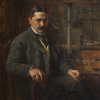Friday, September 25, 2015, 6:00pm, Marshall D. Shulman Seminar Room (1219 IAB, 420 West 118th St.)
Originally from Yugoslavia, a country that no longer exists except in books and films, Iva Radivojević’s family immigrated to Cyprus to escape political unrest. Raised in Cyprus, she is approaching the film as a personal exploration of what it means to have a hybrid existence in which one is always searching for an identity.
The title “Evaporating Borders” corresponds to the idea that the erosion of boundaries and borders (both physical and metaphoric) defamiliarize the narratives of selfhood through which identities take shape and reproduce themselves. The flow of populations, commodities and information is associated with loss of traditions, memories and histories. This poses a threat to national identity and translates to discrimination, prejudice, and intolerance. What is apparent in Cyprus is emblematic of hierarchical racial structures around the world, looking to cultures and peoples outside Western borders from a position of superiority.
While the film examines what it means to disassociate from these beliefs, it also explores the principles of inequality precipitated by certain cultures over others, classes against other classes, the concept of motherland, and an essentialized conception of identity. Though the film is told from the director’s personal experience and point-of-view, it is less about her own story than an exploration of the mentioned themes.
The director of the film will join us for the Q&A section.
This event is co-sponsored by the Program of Hellenic Studies at Columbia.





